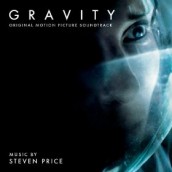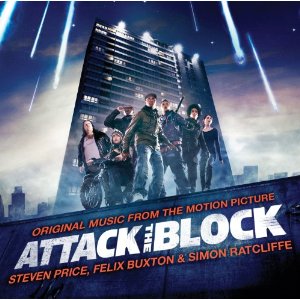It’s been said that in space that no one can hear you scream. Yet for all of its astonishing visual, and technical accuracy, I can be fairly certain that the audience will be thankful that GRAVITY has thrown a bone to allow one glaring stylistic inaccuracy to survive in the void. Namely, it’s the emotionally identifiable companion of music that accompanies the lonely roller coaster ride of female astronaut Ryan Stone. For hearing nothingness would be cold comfort indeed, as it’s the innovative scoring of Steven Price that gives GRAVITY‘s black oblivion a feeling, beating heart.
Of course, that isn’t to mention the musical equivalent of solar winds and radio signals that flood through another stellar example of the kind of alt. sci-fi scoring that’s becoming the cool groove of such movies as OBLIVION and SUNSHINE. Drawing on elements of organically orchestral music, alternative sound effects experimentation, rock and roll and ethereally religious melody, Price’s GRAVITY thrusts listeners into an environment both alien and identifiably human with a musical voice that’s both emotionally graspable, while enticingly never offering one definitive style to hold onto – much like the man-made lifelines that remains so tantalizingly out of reach as Ryan drifts into the great void. Powerfully mirroring her fear of seemingly certain death with the awesomeness that’s likely to claim her, GRAVITY proves a score of haunting transcendence into the immaterial firmament.
But it’s not as if Steven Price’s music has taken the great unknown lying down, as he’s beaten back space invaders twice before. First employing techno hip-hop to rumble with the critters that invaded an English housing project in ATTACK THE BLOCK and then slammed back a few lagers while bringing spy-action rhythms to the symphonic-electric throwback action of the aliens who’ve conquered THE WORLD’S END, Steven Price is now in completely serious territory with “Gravity.” It’s quite a career ascent for the Englishman from an already impressive music editing track record that’s included BATMAN BEGINS, THE LAST LEGION and the LORD OF THE RINGS trilogy. Now rapidly jetting into a top-run composing stratosphere for one of the year’s most highly lauded movies, Steve Price reflects on taking one giant step into an at-first unknowable creative void.
ASSIGNMENT X: How did you get GRAVITY, and how early in the process were you brought into the film?
STEVEN PRICE: GRAVITY was a strange start in a lot of ways. I had done ATTACK THE BLOCK, and I was kind of on the edge of having enough work to support a family, and all that sort of stuff. I ended up doing a little bit of music editing to make some money when I got a call to help out for a couple of weeks on this film called GRAVITY. I knew a little about it, but not very much. I went in assuming it was just kind of a regular job. But my meeting with the director Alfonso Cuaron turned out to be much more of a creative discussion about how to do a score for a film like this, especially since there was no sound in space. He was very keen that this shouldn’t be a very conventional “action” score, and wanted to try new ways of expressing different kinds of intensity. It was a great meeting, and I came out of it a little excited before realizing that I kind of didn’t know what was I going to do next. The only thing I really could do was start trying things and start making noises and a few other ideas, because there was no way of cutting in music from other movies to create a traditional “temp track.” But Alfonso got into what I was doing, and after few weeks, asked me if I would compose the score. It was about a year before we finished it. So GRAVITY ended up becoming an incredibly long project for me.
AX: What kind of musical answers did you come up with for the basic question of why there’d be sound in space, especially for a movie that prides itself on scientific accuracy?
PRICE: What Alfonso and me were trying to achieve was an emotional rollercoaster of a film. The idea is that you experience the journey of this character. And the more we worked on it, the more music seemed to be required to help keep that emotional journey going along. The key from my point of view was not doing the obvious cinematic things with the score, but to treat it like an opportunity to do something different. We were constantly trying things, and constantly seeing if they we were even emotionally justified to have music in particular scenes where normal cinematic convention would make it obvious to have score.
AX: Did you do any non-scoring research into the space shuttle and its astronauts?
PRICE: I was always a little obsessed about reading about all the Apollo missions and all the build up to them. I also looked into some of the reality of the damage that could be done to the space program with all of the debris circling Earth. Equally important was learning about the reality of how there would be sound in space, as would be heard in the space suits of the astronauts. The sound department did a fantastic job of creating those vibrations and low frequency rumbles, which gave a lot of room for the music to do different stuff.
AX: What was the collaboration process like with Alfonso? He seems to take a very intelligent approach to music, especially with his last film CHLDREN OF MEN.
PRICE: Alfonso is constantly questioning and pushing for things. He sees everything in a very creative way. And everything you show him is a starting point to take your ideas to the next step. I would do quite a lot of detailed demos, which we’d watch together, whether we were in the same country or over Skype or whatever. We’d talk about whether the music was helping us, or if it should be a bit more thematic. We just kept pushing things Sometimes we’d go a bit too far, and then pull it back. Every cue was a different process, but he constantly challenges you to think a bit further. I’d come out of these meetings so excited, only to sit in my studio the next day having no idea how to accomplish what we were just talking about. I’d scratch my head for a little bit with a new way to realize the idea, and then the whole musical process would start again. It was a constantly evolving process.
AX: GRAVITY has a sound that’s reminiscent of 70’s progressive rock. Are you a fan of that genre?
PRICE: I like expansive stuff that has a lot of space in it, like some of the early Pink Floyd albums. Alfonso and I would listen to a lot of music as we were making GRAVITY. Some of it had classical influence like Gyorgy Ligeti. Then there were more contemporary influences like Godspeed and the Black Emperor, a Canadian band that has very slowly building ideas.
AX: What kind of musical gear went into GRAVITY, and what kind of balance did you want between the electronic instruments and the organic ones?
PRICE: Alfonso was very keen on completely blurring of the line between the organic and electronic. When it came to the electronic side of it they always needed to feel organic. Because a lot of the spacecraft are old and not very shiny, modern electronics seemed to never really cut it. That made the musical approach jell with the visuals more. A lot of ideas that started off organic also ended up being treated electronically, like textures that might have derived from guitar strings, or a human voice. A glass harmonica genius named Alastair Malloy, and a great church pipe organ played by Philip Collin also figure into the score. Everything got put through processing until it felt right, especially when it came to making the orchestra have the feeling of how the camera was moving.
AX: There are quite a bit of musical “sound effects” in the track “Debris.”
PRICE: That was something that was opened up to me by the idea that there was no traditional sound design. You see some space films and the explosions are very audible, and very sound design-y. Alfonso wanted me to try to express things that ordinarily would be sound in a musical way. So the composition serves a dual purpose in that way.
AX: Have you ever felt any real moments of terror and isolation? And if so, how did you want to translate that emotion into what Ryan goes through?
PRICE: I don’t think I’ve ever been through anything quite like that! The thing with this film was that there’s this weird combination of beauty and terror. It was always pushing those extremes with my score. There’s a certain feeling in the stomach when things go out of your control, and create panic and desperation. It’s a feeling as much as a rational thought. So there are certainly moments in the score where we really went for that absolute feeling of being overwhelmed. It had to be used in the right places. You want the audience to totally feel with Ryan and be in her head. GRAVITY is definitely the most “surround” score I’ve heard. We really pushed the usage of the speakers around you with a Dolby Atmos mix to create a really immersive experience to put you up there in space with her and Matt.
AX: How did you want to use a heartbeat in the score?
PRICE: There’s definitely a musical pulse in there. It’s been funny hearing from people who’ve seen the film that this “heartbeat” was so low and deep that it seemed to regulate the audience members’ own breathing! We worked on this weird, subliminal tension that would really link people with what Ryan was feeling.
AX: “The Void” has a “radio wave” pulse motif to it.
PRICE: There’s a lot of sounds that come and go like that in the score. That scene has some wonderful camera work in the film where you seamlessly enter into Ryan’s helmet. So the whole sound of the goes to a “close up” and changes as you’re in there. There was a lot of perspective stuff going on there that the music helps convey. She’s still trying to talk on the radio, which made its sounds intrinsic to the score. I even created an instrument to carry that “radio” melody, one that’s “tuned in” at points, and drifts away at others. It’s all part of the shifting layers that hopefully pull you into Ryan’s perspective.
AX: There are also very really simple cues that only use a piano, while others use giant washes of sound. How did you figure out where to do smaller orchestration before going onto much denser music?
PRICE: It all came right from the script. The structure of this film has always been very clear about where there are moments for the music to simplistically “breath” with the beautiful imagery. And in the meantime, you’re getting ready for the next rush. There are so many heart-stopping moments in the film.
AX: The whole score seems to be building for this sense of release.
PRICE: Again, that’s completely story led. The theme always interlinks with Ryan’s back-story, which was always something we felt like we could go with a more emotional take on. So the score definitely reaches a climatic point where we needed to support and honor her character.
AX: It’s interesting that so many cues on the GRAVITY album have a very sharp “out,” like the oxygen is instantly being sucked from the room.
PRICE: That’s one of the things we discovered very early on in the process. We wanted to kind of empathize silence, and make the point of the absolute isolation of the vacuum of space. You’re overwhelmed by the sound, and then there’s nothing. Yet it doesn’t feel quiet in the room after you’ve had that.
AX: When you have a character that’s completely isolated, the music almost becomes the other person with them.
PRICE: I wanted to convey that the music is Ryan. It reflects her feelings throughout this, and her inner dialogue. The music is as overwhelming as her experience, while at other times it’s feeling sadness, or is immersed in her memories.
AX: It’s almost as if the score is playing the “stages” of her acceptance towards what seems to be an inevitable fate.
PRICE: I’m thrilled that that comes across just in the music, because gravity is as much of an emotional journey as it is a roller coaster ride for an hour and a half. In that time, her character does change and evolve. There is kind of ultimately rebirth as well that was there from the word “go” in the themes that haunted Alfonso and me.
AX: You’re riding the wave of these progressive science fiction scores like M83 and Jospeph Trapanes’s OBLIVION and John Murphy’s SUNSHINE. How do you think this approach is changing the face of genre scoring?
PRICE: I wouldn’t dare say how all it’s all going to pan out. But I do think it’s great that the films you mentioned have been open to this sort of style. It’s great that the directors and the studios have supported these kinds of different expressions, especially as there’s been an amazing history of orchestral scores and amazing composers. But it’s great to try to do that in a different way as well, and I’m thrilled to be part of that. GRAVITY isn’t a small budget film, and there was always a lot of pressure there. Yet Alfonso and the studio were incredibly supportive to me through the whole process. No one blinked. Everyone kind of went with it, even when I was trying things that may have sounded very bizarre to their ears.
AX: How do you think this will change the perspective of what people expect from a “space score?”
PRICE: My whole love of film music back in the day was hearing things that were so distinctive to the movie that for the first ten minutes you were thinking ‘Hey, what’s going on here?’ until the music normalized in your head. And then you can’t realize that film without that specific score, which feels unique and proper for that movie. That’s my hope for GRAVITY, because the film itself is such a uniquely emotional experience. This music just feels right for it. score
AX: After the “space” triptych of ATTACK THE BLOCK, THE WORLD’S END and now GRAVITY, do you just want to get more down to Earth for your next score?
PRICE: Yeah, it would be be interesting to do something without a space theme! But I’ve been incredibly fortunate the way it’s worked out with these films so far. The best thing is that every single one of them has been a great story, with really collaborative directors. I hope I can continue that sort of partnership, regardless of the movie’s setting, or genre. II’ll be incredibly lucky if that happens.
Buy Steven Price’s score to “Gravity” HERE. Then attack his “Block” HERE
Special thanks to Peter Hackman for transcribing this interview
Related: Movie Review – GRAVITY
LEAVE A COMMENT BELOW AND LET US KNOW WHAT YOU THINK!
Follow us on Twitter at ASSIGNMENT X
Fan us on Facebook at ASSIGNMENTX
Article Source: Assignment X
Article: Interview with GRAVITY composer Steven Price
Related Posts:














